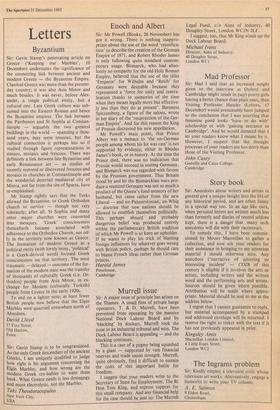Enoch and Albert
Sir: Mr Powell (Books, 26 November) has got it wrong. There is nothing inappro- priate about the use of the word 'reunifica- tion' to describe the creation of the German Empire of 1871, and Robert Rhodes James is only following quite standard, contem- porary usage. Bismarck, who had abso- lutely no sympathy for the old Holy Roman Empire, believed that the use of the titles `Emperor' for Wilhelm and 'Reich' for Germany were desirable because they represented a 'force for unity and centra- lisation thanks to memories of the time when they meant legally more but effective- ly less than they do at present'. Baroness Spitzemberg, a figure of the salons, wrote in her diary of the `resurrection of the Ger- man Empire'. And for this reason the King of Prussia distrusted his new appellation.
Mr Powell's main point, that Prince Albert was a menace to 'the un-German people among whom his lot was cast' is not supported by evidence, either in Rhodes James's book, or in history. At the time the Prince died, there was no indication that Prussia would succeed in uniting Germany, and Bismarck was not regarded with favour by the Prussian government. That Britain stood by and let the Bismarckian wars pro- duce a reunited Germany was not so much a product of the Queen's fond memory of her husband, but came rather from the new Liberal — and un-Palmerstonian, un-Whig — doctrine that new nations should be allowed to establish themselves politically. This perhaps absurd and probably dangerous belief was produced entirely within the parliamentary British tradition of which Mr Powell is so keen an upholder. If he wants to play his trick of blaming foreign influences for whatever goes wrong with British policy, perhaps he should care to blame French ideas rather than German princes.
Harold James
Peterhouse, Cambridge














































 Previous page
Previous page